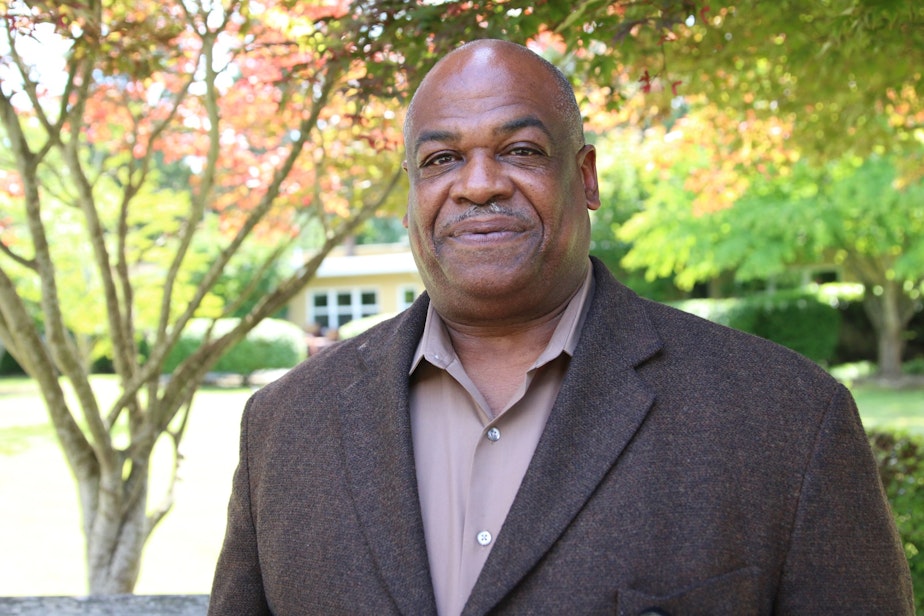As a youth, I ran from police. Now, I work with them.

Maurice Lee is the Chief Operating Officer for Navos, a Northwest non-profit that helps people struggling with addiction, mental illness, or chronic homelessness get back on their feet and stay out of the criminal justice system.
Lee's life experience as a Black man who works professionally with police has given him a complex perspective on police reform. He tells KUOW about his past and how it informs his view of police.
This is part of a series of personal stories from the front lines of the pandemic and the protests for racial justice.
With all the conversations around defunding police departments, non-profits like Navos offer an alternative to traditional policing, in limited situations.
Growing up in New York, I was a pretty recalcitrant youth and actually had several encounters with the police. I actually have spent time in the state prison system as a result -- for drug sales primarily, and robbery.
I wasn’t Pablo Escobar. I didn't have an airstrip. But for a 13-year-old in New York City, to have $20,000 in their pocket, that was a lot of money.
I don't know that I was ever built for it. You know, I always had a conscience, always was scared. But I was more scared of not having the things that I needed for safety, for prosperity, for camaraderie. So, in that environment that I grew up, it was the socially-acceptable norm. And it was the skill set that you needed to survive in that environment.
Sponsored
It's really hard not to come in contact with the criminal justice system, with law enforcement, if you're growing up in an environment where poverty has been branded generationally; where there's not proper education, where you can't make a livable wage, where crime is pervasive and it's over-policed.
And then we enact laws that make it impossible. I mean, you've got people serving life sentences right now because they stole a carton of cigarettes. It just makes you really hesitant to have trust in a system that is designed to protect you.
Well, my life really spiraled out of control. You know, with drug addiction. I actually wound up being homeless. I was in an abandoned building in the Bronx on Third Avenue, around a 55 gallon drum with a fire in it in the wintertime, freezing cold, dirty, and the stench on my body was unbearable.
And I don't know, at that point, I guess I had like some type of awakening. And I realized I really didn't want to die. And I didn't want people to find me in that type of condition. So I sought help.
I sought help through a place similar to Navos, a place called Phoenix House. And in time, I got my life together. After a couple of years, I was asked to go work in the criminal justice system.
Sponsored
So through my work with law enforcement I’ve found my best way to impact change was to work with them.
Since then, I've done work around prison reform and looking at how we can not criminalize, especially African Americans; and how do we get people better? How do you get somebody back on their feet rather than holding them down?
If you can take somebody like me who was exposed to the criminal justice system, uneducated, and provide them with some education and an opportunity and the support, they can become a contributing member of society. They can serve as advocates they can help shape policy, they can pay taxes.
I've got five daughters, today, that I'm proud to say, this year, three of them graduated college and my baby daughter graduated high school. I've broken some cycles in my family of teen pregnancy. None of them have children yet. I'm sure they will soon. But those are things that were uncommon in my family.
Your ancestors made conscious decisions about how they would structure this society, in this nation, that has helped have an influence on who you are today.
Sponsored
My ancestors didn't have that choice to make those decisions, to help shape my future. My ancestors were slaves. My ancestors were terrorized and, you know, lynched. My ancestors didn't have the same opportunities in education. They didn't have accumulated wealth. And the list goes on and on and on.
Is that your fault or the next person's fault? No. OK. But those decisions were made and it created this environment.
Our police force is what it is because of some of those decisions that were made; some of the propaganda, some of the depictions of minorities and African Americans, years ago. And that's been perpetuated.
Did the police create that today? No, they walked into it when they joined the force. They walked into that. And, you know, a lot of good police, a lot of good parole officers, social workers, walked in with good intentions and they often get ground up in those systems.
We have to have order. But are we far from where we need to be at? Absolutely.
Sponsored
Do I trust every officer? No. If the lights come on in the back of my car, even where I sit today, I still have an anxiety that probably somebody else is not going to have. And at the end of the day, even if I have committed a crime, it doesn’t give you the authority to kill me.

